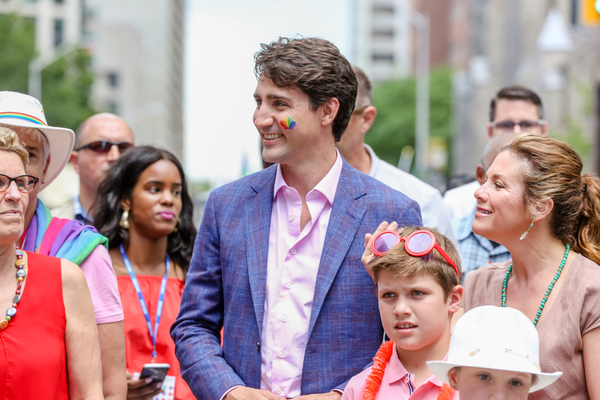Can men be feminists, or is it perhaps not a term men are entitled to appropriate?
Yes, of course they can. However, we also need to recognise the fact that due to the way our society has been structured, men already have certain inherent advantages. The broader structural factors, including the economy and our existing power structures continue to benefit men in particular. This is their platform.
Men are often automatically accepted and acknowledged as experts in their fields, whereas women have to first demonstrate that they’re up for the task
This is observable in the way in which we construct the idea of expertise for example. Men are often automatically accepted and acknowledged as experts in their fields, whereas women have to first demonstrate that they’re up for the task before they get that same level of recognition.
In addition, it is also easier for men to be accepted as feminist. It is all too easy to dismiss women’s feminist advocacy as purely an attempt to gain individual benefits, rather than recognising the universality of equal rights.
My main point here is that while it is our obligation, as men, to be feminists, we also need to acknowledge how much easier it is for men occupy that space than it is for women.
If asked publicly whether or not you call yourself a feminist, what would you say? And why?
I publicly call myself a feminist, and in fact, I believe it’s extremely important to do so in order for us to start challenging and dismantling the structures that maintain the traditional gender roles that in turn restrict both men and women.
For example, in Finland, and this may be the case in Australia as well, the traditional male role is extremely narrow; men are expected to focus on their work and career, and those who wish to prioritise the domestic life and for example go on a long parental leave still face a lot of prejudice and judgement from others.

Treating people as individuals with their own unique interests and desires will ultimately liberate both men and women (image: www.villeniinisto.fi)
In addition, because the traditional male role is so work-centric and career-focused, things such as being made redundant can have far reaching negative ramifications such as alcoholism – and even homelessness.
… feminism is not just about women, it is also about liberating men.
Dismantling these gender stereotypes, and treating people as individuals with their own unique interests and desires rather than simply defining them through their gender construct will ultimately liberate both men and women. This is why I’m a feminist, because feminism is not just about women, it is also about liberating men.
… the most vocal opponents of feminism are often those who ascribe to cultural chauvinism …The far right in particular utilises a rhetoric that is openly hostile towards women
However, we do need to recognise that the most vocal opponents of feminism are often those who ascribe to cultural chauvinism, and as such, things such as harassment and hate speech still impact women in their everyday lives much more so than men. The far right in particular utilises a rhetoric that is openly hostile towards women. This assists them in hampering any efforts to progress gender equality, and enables them to continue to spread racism and the oppression of minorities. In that vein, it is also easier for men to speak up on equal opportunities in reference to anti-discrimination and racism. In my experience, female politicians for example often receive a lot harsher criticism and feedback than their male counterparts.
Is male feminism newly fashionable (Justin Trudeau for example)?
I would say that it is to a certain extent. The key issue here is that when people in positions of power declare themselves as feminists, we need to hold them accountable and demand action. It is so easy to say that you support feminism in principle, and of course this is part of leading by example, being a good role model – but it is not enough. We need to see this reflected in the decision-making and the policies that further gender equality and enable women to reach those leadership positions both in the public and the private sector. Trudeau has delivered in the sense that Canada now has more female ministers than ever before, but it goes beyond that.
What it boils down to is that feminism cannot be just a throwaway line you use to score points
What it boils down to is that feminism cannot be just a throwaway line you use to score points. If you declare yourself a feminist, you also have obligations. Trudeau has certainly done more than just symbolic gestures, but even in Canada there’s still more to be done in terms of improving women’s status in the job market, and ensuring that parental leave provisions can be accessed equally.

Trudeau formed Canada’s first gender-balanced cabinet in 2015
Why do you think a significant cohort of young women refuse to use the term ‘feminist’ about themselves, and yet ascribe to all tenets of feminism?
I think to an extent, there’s been a concerted effort by certain demographics to maintain the prevailing power structures, and in that process they’ve managed to create this image of feminism as stigmatising. Those who are more on the conservative spectrum in particular often tend to be proponents of the traditional male-breadwinner, female-carer roles, and it plays to their advantage to maintain the status quo. Narrowly labelling and categorising feminism as something that solely benefits women can actually deter people who otherwise believe in equality and ascribe to all the tenets of feminism. In addition, the criticism that you receive as a feminist can be particularly vile and cruel.
Narrowly categorising feminism as something that solely benefits women can deter people who otherwise believe in equality
This is why I think it is so important for all those who describe themselves as feminists, to actually demonstrate that this is a liberation movement for women and men, for boys and for girls. For those who see feminism as a threat, I just want to point out that it benefits us all if we, as a society, are able to fully utilise our whole talent pool; it benefits us economically, socially, and educationally.
The fact that our current system privileges men, and makes it harder for women to reach those top positions puts us in a much weaker spot economically. In addition to being ethically and morally right, gender equality is interrelated with a strong job market, and it also makes businesses more competitive. This is partly due the fact that when we get rid of those narrow gender roles which dictate the behaviours deemed appropriate for men and women, we enable people to play to their own strengths.
How do we encourage men, young men in particular, to behave as feminists?
We need to make it abundantly clear that feminism liberates young men and boys as well. At the moment, we have significant gaps in the educational outcomes for boys and men in particular. At the other end of the spectrum we have those who are doing ok, and they are the ones who end up in the leadership positions later on. However, on the flip side we know that the boys and men who struggle in school also often end up in the weakest positions in the job market – if they can get gainfully employed in the first place. We need to do more to bridge this gap.
When we subscribe to those narrow ‘boys will be boys’ attitudes based on assumptions about some innate gendered behaviour, we ultimately fail to set the same expectations for them. We let them get off easy when it comes to those core skills such as reading, and brush it off with remarks about boys being more active and wilder than girls.
We know from previous research, that the more we support boys in their early formative years and through their primary schooling, the better their future outcomes. This is why we need a take a feminist approach to education. It benefits everyone.




